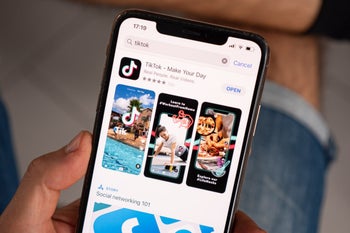
TikTok picks Oracle over Microsoft as possible U.S. suitor
by Alan FriedmanWith Tuesday's deadline forcing TikTok parent company ByteDance to divest itself of the short-form app's U.S. operations or get banned in the states, Reuters reports that a group led by U.S. tech firm Oracle has been chosen by TikTok to buy the U.S. version of the very popular app for an undisclosed amount. Just before Oracle was announced as the winner of the contest, Microsoft said that it had been informed by ByteDance that TikTok would not be sold to the software giant. The company was originally the front runner in a deal that was estimated to be valued at $20 billion dollars and up.
Oracle wins the battle for the U.S. operations of TikTok
Walmart was also expected to be part of the Microsoft bid and it is unclear whether the retailer still has an interest in TikTok. In a statement announcing that it is bowing out of the battle for the U.S. operations of TikTok, Microsoft said, "We are confident our proposal would have been good for TikTok's users, while protecting national security interests. To do this, we would have made significant changes to ensure the service met the highest standards for security, privacy, online safety, and combatting disinformation, and we made these principles clear in our August statement. We look forward to seeing how the service evolves in these important areas."

The U.S. operations of TikTok are being purchased by Oracle
TikTok, with over 2 billion installs worldwide, has 100 million monthly users in the states, up from 11 million in early 2018. The app, which has a large community of teenage users, shows community created videos of 15 or 60 seconds in length. Content includes lip-syncing, pranks, dancing, and more. During the pandemic, when teens and others were locked up in their homes, TikTok become even more popular than ever. And that popularity got the Trump administration worrying that the Communist Chinese government could obtain personal information from TikTok users and send it to Beijing. ByteDance says that the U.S.operations of TikTok have only two servers in operation with one in the states and the other in Singapore. The next step requires the Committee on Foreign Investment in the U.S. (CFIUS) and the White House get an approval for the deal. People familiar with the transaction say that it should satisfy fears that some participants had about the security of data obtained by TikTok in the U.S.
China almost threw a last-second issue into the deal when the Chinese government added new export restrictions that banned the U.S. from receiving certain information created by artificial intelligence. These algorithms are used to determine which videos TikTok users get to see and are considered the app's "secret sauce'" they were believed to be part of the negotiations of the deal. President Trump announced an executive order back on August 6th, giving ByteDance 45 days to to divest TikTok before demanding that its U.S. operations be banned. The White House considers the app to be a national security threat.
Microsoft, as we mentioned earlier, was originally the front runner and had decided to take on Walmart as a partner. The original plan called for both to acquire TikTok’s operations in the U.S. along with those in Australia, Canada and New Zealand. For the deal to close, ByteDance will need to get approval from both the U.S. and Chinese governments.
This isn't the first time that the U.S. government has gotten itself involved in a messy takeover battle involving China. In March 2018, the president blocked Singapore chipmaker Broadcom from purchasing Snapdragon chip designer Qualcomm for $117 billion. The U.S. was reportedly concerned that the deal would weaken Qualcomm thus giving power to the Chinese. A few months later, Qualcomm's bid to acquire Dutch company NXP Semiconductors NV was blocked by Chinese antitrust regulators.